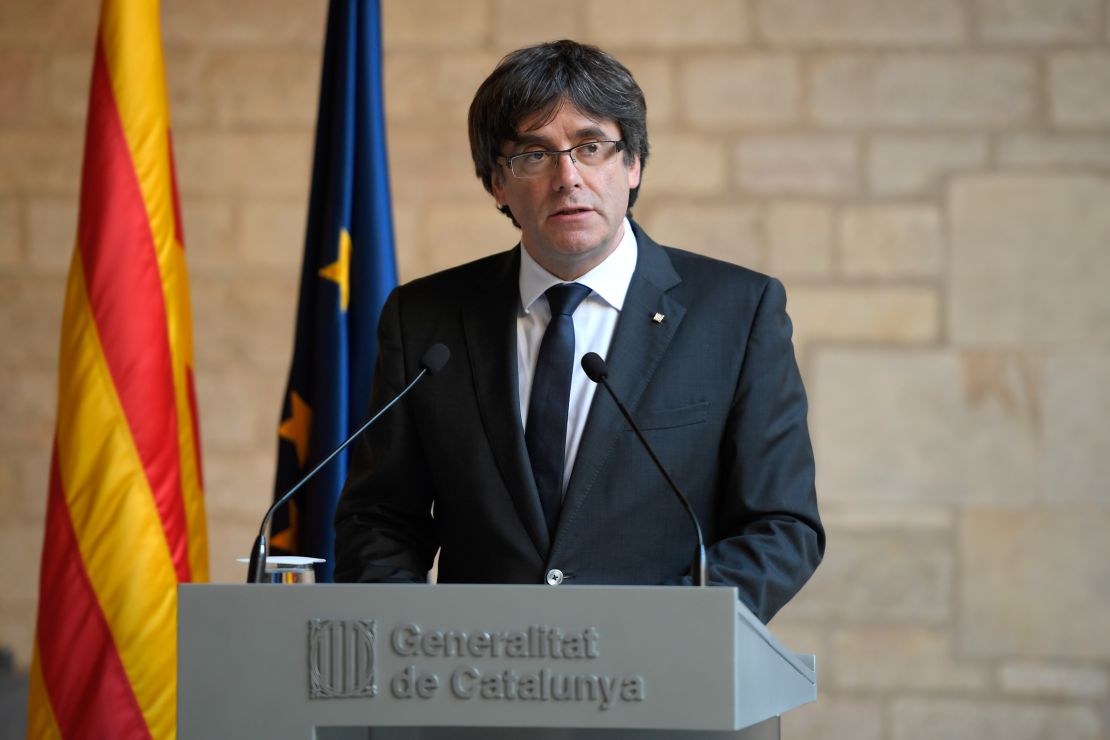The Catalan leader’s high-wire bid for independence from Spain faltered on Thursday when he backed away from a plan to call new elections amid disagreement within his own party.
Catalan President Carles Puigdemont said he had considered the option of dissolving the regional Parliament and calling new elections, in what appeared to be a last-ditch effort to stop Madrid from taking control of the region.
But in a public statement in Barcelona, the regional capital, Puigdemont rejected the idea, apparently because he could not obtain guarantees from the central government that it would not press ahead with a plan to impose direct rule on the region.
“My obligation and responsibility is to explore all the possibilities, absolutely all of them, to find a solution through dialogue, an agreed solution, to a political conflict that is of a democratic nature,” he said.

At a heated meeting of the Catalan Parliament on Thursday evening, MPs struggled to find a way forward.
Ines Arrimadas, leader of the liberal Ciutadans Party, blasted Puidgemont, saying that it was not too late to call for elections while blaming him for dividing the Catalonian public. “We are losing international legitimacy and you can’t do that to Catalans,” Arrimadas said.
Lluís Rabell, leader of the Catalan arm of the left-wing Podemos party, said it was time to give up on the unilateral declaration of independence. “Catalonia does not need more martyrs,” he said.
Madrid has scheduled a vote in the Spanish Senate for Friday, in which members will decide whether to suspend Catalonia’s autonomy and put it under Madrid’s control.
Puigdemont’s announcement came after a day of confusion in Barcelona. Puigdemont delayed the statement after two MPs in his Catalan European Democratic Party (PDeCAT) said they were unhappy with the plans for new elections.
“I respect the decision, but I do not share it,” MP Albert Batalla said on Twitter, after a Catalan newspaper said Puigdemont was on the verge of calling elections. “Today I renounce as an MP and I give up my membership at the @Pdemocratacat,” he wrote.
Another MP, Jordi Cuminal, did the same. “I do not share the decision of calling for elections. I resign from my seat as MP and I give up my membership at the @Pdemocratacat,” he tweeted.
It was unclear whether the two MPs would reverse their decision in the light of Puigdemont’s later announcement.
In his speech, Puigdemont said he was willing to call for an early election as long as he had “certain guarantees” surrounding the vote. He did not specify from whom he sought the guarantees, but he appeared to be alluding to Madrid. “But there were no such guarantees that would justify me today calling for an election,” he said.
Spain was plunged into its worst political crisis in decades on October 1, when Catalonia held an independence referendum, and Catalan and Spanish leaders in Madrid have been in political deadlock ever since.
Madrid slammed the referendum as illegal, but Catalan leaders took its results as a mandate to declare a split from the country.
Spanish Prime Minister Mariano Rajoy has threatened for weeks to impose direct rule on Catalonia as a way to quash Puigdemont’s plan to declare independence. He said Madrid had prepared all the documents to employ the never-before-used Article 155 of the country’s Constitution.
More than 2.25 million people turned out to vote in the October 1 referendum, ruled illegal by Spain’s consitutional court. Catalan authorities said 90% of voters favored a split. But the turnout was low – around 43% of the voter roll – which Catalan officials blamed on the central government’s efforts to stop the referendum.
CNN’s Claudia Rebaza and journalist Elena Gyldenkerne reported from Barcelona. Angela Dewan reported from London.


